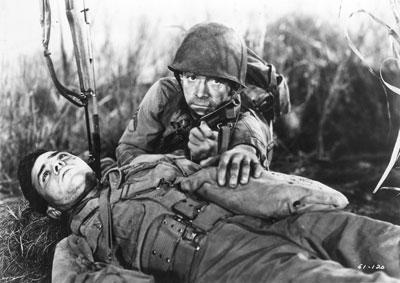Directed by Lewis Milestone
Veteran Hollywood pro Lewis Milestone, who launched his career with the watershed World War I drama All Quiet on the Western Front (1930), directed this realistic combat film about an American army platoon's daylong march deep into enemy territory. Adapted by screenwriter Robert Rossen from Harry Brown's acclaimed novel, A Walk in the Sun remains faithful to its literary source—"The book was my script," quipped Milestone—as the narrative focus shifts nimbly between a number of different soldiers within the multi-ethnic unit.
Dana Andrews, Lloyd Bridges and John Ireland head the stellar all-male cast as grunts who storm the beach near Salerno before embarking on a dangerous inland maneuver. Action set pieces alternate with extended scenes eavesdropping on the infantrymen as they hike cross-country towards their uncertain final objective. The tension and brutality of battle are offset by grim humor and a steady stream of colorful banter, with wise guys Richard Conte and George Tyne getting the lion's share of salty dialogue.
Roundly hailed as important on its initial release, A Walk in the Sun earned excellent notices: "a swiftly overpowering piece of work" said the "New York Times," while the "Los Angeles Times" called it "a great war picture ... one of the best to come out of World War II." With its unsentimental tone and chorus of GJ protagonists, the film also proved influential as a template for the genre, inspiring similar configurations in any number of later combat movies up to and including Steven Spielberg's epochal Saving Private Ryan (1998).
–Jesse Zigelstein
Twentieth Century-Fox Producer: Lewis Milestone Screenwriter: Robert Rossen Based on the novel "A Walk in the Sun" by Harry Brown Cinematographer: Russell Harlan Editor: Duncan Mansfield Cast: Dana Andrews, Richard Conte, Sterling Holloway, Norman Lloyd, George Tyne, John Ireland, Lloyd Bridges
35mm, 117 min.
Preserved in cooperation with the British Film Institute from a 35mm nitrate fine grain master positive and a 35mm acetate composite dupe negative. Laboratory services provided by Triage Motion Picture Services, Audio Mechanics, DJ Audio. Special thanks to: Schawn Belston, Twentieth Century Fox.






 Mobile Navigation
Mobile Navigation

